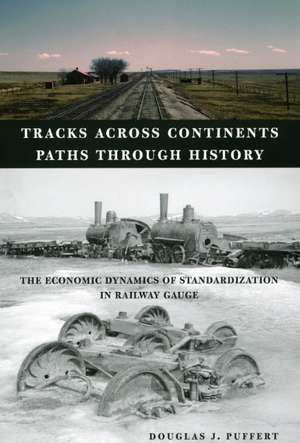Tracks across Continents, Paths through History: The Economic Dynamics of Standardization in Railway Gauge: Emersion: Emergent Village resources for communities of faith
Autor Douglas J. Pufferten Limba Engleză Hardback – 18 mai 2009
A standard track gauge—the distance between the two rails—enables connecting railway lines to exchange traffic. But despite the benefits of standardization, early North American railways used six different gauges extensively, and even today breaks of gauge at national borders and within such countries as India and Australia are expensive burdens on commerce. In Tracks across Continents, Paths through History, Douglas J. Puffert offers a global history of railway track gauge, examining early choices and the dynamic process of diversity and standardization that resulted.
Drawing on the economic theory of path dependence, and grounded in economic, technical, and institutional realities, this innovative volume traces how early historical events, and even idiosyncratic personalities, have affected choices of gauge ever since, despite changing technology and understandings of what gauge is optimal. Puffert also uses this history to develop new insights in the theory of path dependence. Tracks across Continents, Paths through History will be essential reading for anyone interested in how history and economics inform each other.
Drawing on the economic theory of path dependence, and grounded in economic, technical, and institutional realities, this innovative volume traces how early historical events, and even idiosyncratic personalities, have affected choices of gauge ever since, despite changing technology and understandings of what gauge is optimal. Puffert also uses this history to develop new insights in the theory of path dependence. Tracks across Continents, Paths through History will be essential reading for anyone interested in how history and economics inform each other.
Din seria Emersion: Emergent Village resources for communities of faith
-
 Preț: 144.99 lei
Preț: 144.99 lei -
 Preț: 94.22 lei
Preț: 94.22 lei -
 Preț: 133.01 lei
Preț: 133.01 lei -
 Preț: 146.50 lei
Preț: 146.50 lei -
 Preț: 125.33 lei
Preț: 125.33 lei -
 Preț: 179.93 lei
Preț: 179.93 lei -
 Preț: 307.53 lei
Preț: 307.53 lei -
 Preț: 138.81 lei
Preț: 138.81 lei -
 Preț: 208.31 lei
Preț: 208.31 lei - 18%
 Preț: 348.59 lei
Preț: 348.59 lei -
 Preț: 156.84 lei
Preț: 156.84 lei -
 Preț: 300.55 lei
Preț: 300.55 lei -
 Preț: 273.93 lei
Preț: 273.93 lei -
 Preț: 176.35 lei
Preț: 176.35 lei - 9%
 Preț: 352.77 lei
Preț: 352.77 lei -
 Preț: 544.68 lei
Preț: 544.68 lei -
 Preț: 310.21 lei
Preț: 310.21 lei - 8%
 Preț: 311.68 lei
Preț: 311.68 lei -
 Preț: 105.59 lei
Preț: 105.59 lei - 8%
 Preț: 360.28 lei
Preț: 360.28 lei -
 Preț: 126.95 lei
Preț: 126.95 lei -
 Preț: 176.35 lei
Preț: 176.35 lei - 6%
 Preț: 324.95 lei
Preț: 324.95 lei -
 Preț: 101.43 lei
Preț: 101.43 lei -
 Preț: 143.71 lei
Preț: 143.71 lei -
 Preț: 185.37 lei
Preț: 185.37 lei -
 Preț: 163.52 lei
Preț: 163.52 lei - 12%
 Preț: 251.95 lei
Preț: 251.95 lei -
 Preț: 182.98 lei
Preț: 182.98 lei - 18%
 Preț: 2261.34 lei
Preț: 2261.34 lei -
 Preț: 166.59 lei
Preț: 166.59 lei -
 Preț: 159.42 lei
Preț: 159.42 lei -
 Preț: 115.82 lei
Preț: 115.82 lei -
 Preț: 277.54 lei
Preț: 277.54 lei -
 Preț: 161.12 lei
Preț: 161.12 lei -
 Preț: 114.66 lei
Preț: 114.66 lei - 12%
 Preț: 290.56 lei
Preț: 290.56 lei -
 Preț: 183.89 lei
Preț: 183.89 lei - 17%
 Preț: 423.14 lei
Preț: 423.14 lei - 9%
 Preț: 352.50 lei
Preț: 352.50 lei -
 Preț: 147.26 lei
Preț: 147.26 lei - 8%
 Preț: 563.24 lei
Preț: 563.24 lei -
 Preț: 229.92 lei
Preț: 229.92 lei - 8%
 Preț: 346.31 lei
Preț: 346.31 lei -
 Preț: 216.08 lei
Preț: 216.08 lei -
 Preț: 215.51 lei
Preț: 215.51 lei - 9%
 Preț: 353.24 lei
Preț: 353.24 lei -
 Preț: 140.57 lei
Preț: 140.57 lei -
 Preț: 92.35 lei
Preț: 92.35 lei - 8%
 Preț: 564.99 lei
Preț: 564.99 lei
Preț: 371.97 lei
Preț vechi: 464.12 lei
-20% Nou
Puncte Express: 558
Preț estimativ în valută:
71.23€ • 72.69$ • 59.93£
71.23€ • 72.69$ • 59.93£
Carte indisponibilă temporar
Doresc să fiu notificat când acest titlu va fi disponibil:
Se trimite...
Preluare comenzi: 021 569.72.76
Specificații
ISBN-13: 9780226685090
ISBN-10: 0226685098
Pagini: 376
Ilustrații: 21 line drawings, 14 tables
Dimensiuni: 152 x 229 x 30 mm
Greutate: 0.64 kg
Editura: University of Chicago Press
Colecția University of Chicago Press
Seria Emersion: Emergent Village resources for communities of faith
ISBN-10: 0226685098
Pagini: 376
Ilustrații: 21 line drawings, 14 tables
Dimensiuni: 152 x 229 x 30 mm
Greutate: 0.64 kg
Editura: University of Chicago Press
Colecția University of Chicago Press
Seria Emersion: Emergent Village resources for communities of faith
Notă biografică
Douglas J. Puffert teaches economics at The King’s College, New York.
Cuprins
List of Illustrations
Preface
Part 1 Introduction
1 Overview
2 Technology and Other Systematic Elements in the Selection of Gauge
Part 2 The History of Gauge Selection
3 Britain and Ireland
4 The Development of Diversity in North America, 1830 to 1865
5 The Resolution of Diversity in North America, 1866 and After
6 Continental Europe
7 India and Australia
8 The Wider World
Part 3 The Economics of Gauge Selection
9 The Selection of Track Gauge as a Path-Dependent Economic Process
10 Variations and Extensions of the Model
Part 4 Conclusion
11 The Dynamics of Track Gauge Standardization
Appendixes
Notes
Bibliography
Index
Preface
Part 1 Introduction
1 Overview
2 Technology and Other Systematic Elements in the Selection of Gauge
Part 2 The History of Gauge Selection
3 Britain and Ireland
4 The Development of Diversity in North America, 1830 to 1865
5 The Resolution of Diversity in North America, 1866 and After
6 Continental Europe
7 India and Australia
8 The Wider World
Part 3 The Economics of Gauge Selection
9 The Selection of Track Gauge as a Path-Dependent Economic Process
10 Variations and Extensions of the Model
Part 4 Conclusion
11 The Dynamics of Track Gauge Standardization
Appendixes
Notes
Bibliography
Index
Recenzii
“An excellent accomplishment. Douglas Puffert has analyzed exhaustively the evolution of the various diverse railway track gauges since the emergence of ‘modern’ steam locomotives and wrought iron rails in the 1820s. No other book has attempted to compile, use, and interpret such a variety of historical information on gauges and employ this kind of economic theory and modeling to explain it.”
“In this ingenious and compelling work, Douglas Puffert shows how much ‘history mattered’ for the standardization of railway gauge. The book is rigorously analytical, but the analysis never stands in the way of a good story. Tracks across Continents is rich with good railway-gauge stories.”
“Meticulously researched and cogently argued, Tracks across Continents will take its place among the classic case studies of technological standards and path dependence. Puffert keeps his ideas accessible to non-economists, and fills his pages with delightful and illuminating details about the history of railway engineering and construction.”
